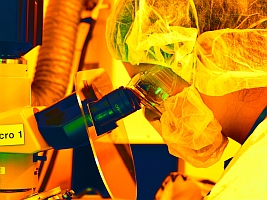Virginia Commonwealth University in Richmond has received two grants totaling $1.75 million from National Science Foundation and the Semiconductor Research Corporation to create more energy-efficient computing devices. Semiconductor Research Corporation is an international technology research consortium of member companies and university research programs.
The grants fund research to translate theoretical work on replacing traditional transistor-based silicon chips with nano-scale magnets that can process data, into practical applications. The team from VCU’s engineering school, led by faculty members Supriyo Bandyopadhyay and Jayasimha Atulasimha, will work with counterparts from University of Virginia in Charlottesville, University of Michigan at Ann Arbor, and University of California at Riverside.
The VCU engineers published their thesis last month in the journal Applied Physics Letters (paid subscription required), indicating that arrays of nano-scale magnets can provide the processing power of transistor/silicon chips with a minute fraction — up to one ten-thousandth — of the power required or heat generated. These arrays make it possible to pack many more devices on smaller chips than transistor/silicon chips.
The vastly lower energy requirements of this design increase the likelihood of designing chips and devices that can run without batteries, by capturing ambient energy from the application’s environment. One application of this kind would be implanted medical devices, such as sensors in the brain of epileptics that monitor neurological signals to warn of impending seizures. This processor would run by harvesting energy only from the patient’s head movements, without requiring a battery.
Read more: Nanolasers Grown on Silicon, Boost New Chip Prospects
* * *


 RSS - Posts
RSS - Posts
[…] Read more: NSF, Industry Consortium Fund Advanced Chip Research […]